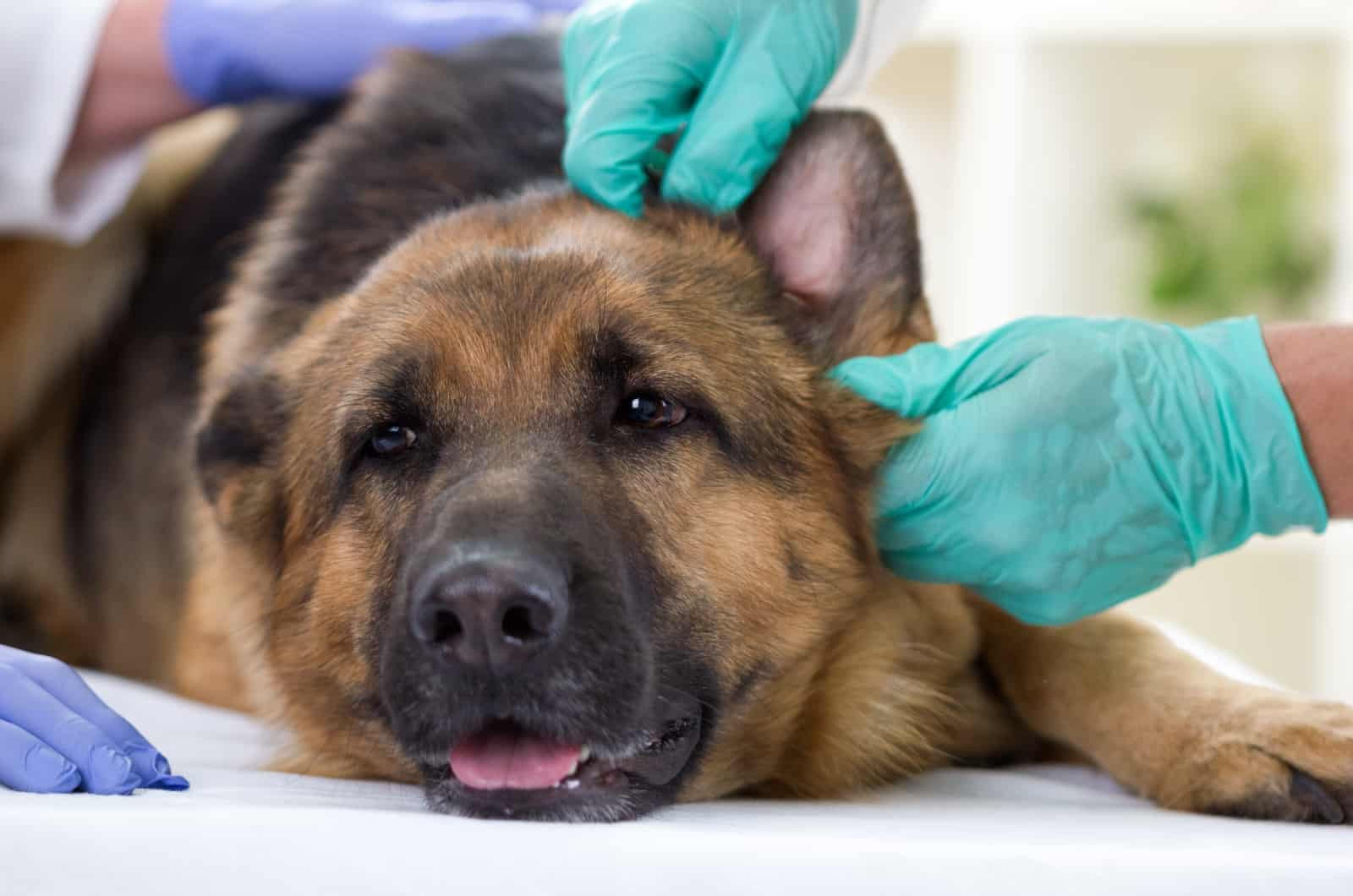Ear infections in dogs can go unnoticed for a while before the onset of symptoms. Once they are displayed, your German shepherd might have already been sick for a while by then.
Dog owners can disregard some of those symptoms because they can be subtle or generic clinical signs of non-infectious conditions. Ear mites have similar displays of discomfort, so an ear infection can be misdiagnosed.
However, we should be aware what signs point to an ear infection in German shepherds to react in time and help prevent them in the future. Here are the five clinical signs of ear infection in GSDs.
This GSD Behavior Might Mean It Has An Ear Infection

German shepherds are among the dog breeds more prone to ear infections. Although this is not a serious condition, ignoring the symptoms can let the infection spread into the inner ear.
The most common condition among all dogs is outer ear infection or otitis externa. It can happen for multiple reasons, but the symptoms are almost always the same. Some are more clear-cut, others can make you suspicious of an ear infection, so let us list them all.
In the majority of cases, the first symptom that appears is your German shepherd scratching its ear more often than usual. Because they cannot get rid of the pressure, congestion, or pain in the ear, scratching is a natural response.
However, the scratching can sometimes create more damage, facilitating the entry of opportunistic pathogens into the bloodstream. An open wound is more prone to infection and will take longer to heal than an undamaged ear.
Shaking the head (suddenly or gradually increasing in frequency) usually happens simultaneously with ear scratching. Although the sudden onset of these two symptoms will probably enough to get your GSD to a vet, the slowly progressing variant can be tougher to spot.
Keep in mind that German shepherds are known for their head tilting, but do not misinterpret that with a symptom of an ear infection. With ear infection mediated tilts, you will notice the facial expression of your dog will not be curious or surprised as with the quirky head tilt.
German shepherds mostly come in darker coat colors, so redness and scaly patches of skin on the ear are difficult to notice. Inspecting your dog’s ears sporadically might help you catch the clinical signs sooner.
One of the more disturbing signs of a German shepherd ear infection is discharge from the ears. At this point, it is highly likely the middle or inner ear is infected, too. This symptom warrants an immediate visit to the vet.
Swelling of the ear canal due to inflammation is a predominantly middle or inner ear infection symptom, which can be accompanied by a slight loss of hearing in the dog.
Diagnosis And Treatment

The more serious the symptom, the more complex the diagnostic process will be. With the initial symptoms (ear scratching and head shaking), a simple physical examination usually yields an easy diagnosis of ear infection.
With German shepherds that are not cooperative and become agitated while the veterinarian performs a palpation test, anesthesia is recommended. In milder cases, the administration of sedatives is enough to proceed and complete the examination.
While a superficial symptom, such as scaly skin or redness, can be easily associated with ear infection, taking a sample of the skin for biopsy will help determine whether it is directly related to the infection or an underlying condition.
Similarly, colored or colorless discharge requires the vet to take a sample of it and test it to see what its composition is. Yeast infection and ear mites are most commonly associated with a dark-colored discharge from a dog’s ear.
A comprehensive test of the scaly skin or discharge will include detection of bacteria, fungi, larvae, eggs, and other microorganisms. A dog’s skin already has these organisms living on the surface, but the infection occurs only when there is an imbalance of microorganisms.
For an expedited diagnosis, a smear test of the discharge can give enough information about the origin of the infection. This way, adequate treatment and therapy can be prescribed to counteract the symptoms and give a little more time for conclusive tests.
Do not forget that allergies can also cause inflammation. Testing your dog for allergies is something every German shepherd owner should do as soon as possible.
Different Germs Require Different Treatment Approaches

Once the diagnosis is confirmed, the treatment will depend on the type of pathogen that caused the infection. Bacterial infections are most common, but fungal infections are not uncommon.
Oral antibiotics or antifungals are the main therapy for most German shepherd ear infection cases. They are generally accompanied by over-the-counter ointments that help with the localized symptoms of the infection.
The ointments often have a mixture of antifungal, antibiotic, and glucocorticoids to reduce the inflammation. Keep in mind that cleaning the ear prior to therapy is crucial for therapy to be effective. The earwax can reduce the efficacy.
Milder cases of otitis externa can be successfully treated with ointments only, but long-term symptoms warrant oral medication. Non-steroid anti-inflammatory drugs are prescribed for the pain and can be used with immediate effect.
Never try home remedies without consulting a veterinarian. Many of the ingredients of makeshift remedies can have irritants that will worsen the symptoms or create a fertile ground for the germs to multiply.
Word of warning: buying medication of your own accord is not recommended. Some bacteria, fungi, and parasites are resistant to commonly found drugs. Using inadequate medication can result in complications or even death.
You Can Prevent Ear Infections
While we can go on about treatment and the infection itself, it is far easier and simpler to avoid it altogether. Proper ear hygiene goes a long way, especially in active dogs that spend a lot of time outside.
The easiest way to be proactively about it is to clean the ears once your German shepherd is back home. Do not flush or rinse the ears. Use a wet towel to gently scrape any soil or debris from the ear.
Many of these pathogens live in the ground, so make sure you avoid areas where there are wild animals, as they can spread rabies and equally dangerous viruses and bacteria through defecation and urination.
One sniff of the ground is enough for the germs to enter your dog’s body. One scratch on the ear with feet that have traces of the dirty soil can quickly lead to infection.
Another thing that is vital in German shepherd ear hygiene is keeping the ear dry. Trapped moisture makes any environment an ideal breeding ground for bacteria, fungi, etc. If your dog plays around water often, do make sure you clean the ears and dry them fully.
Some advocates of dog ear plucking might say that removing the hairs from a German shepherd’s ears will improve the airflow and reduce the accumulation of moisture inside the ears.
However, you should never do this as it can damage the hair follicles, which will create microscopic tears in the tissue that pave the way for pathogens to enter the dog’s body.
What If The Infection Is Left Untreated?

Ear infections that have been active for a prolonged period of time can increase the likelihood of recurring infection. The symptoms listed in this article can worsen to the point of causing partial or full loss of hearing.
It is better to be overly cautious than dismissive of symptoms. While your German shepherd is a puppy, you might not even distinguish general puppy whining from a symptom of ear infection. Any excessive scratching, head shaking, or whimpering should be enough to visit the vet.
In many cases, the recurrence of infections and use of strong antibiotics, antifungals, and other germ-appropriate medication can make the pathogens resistant to the drug. This is bound to complicate every GSD owner’s life with needless visits to the vet.
Although rare, some German shepherds and dogs from the herding group can have the Multidrug Resistance Mutation (MDR1) that makes them more overly sensitive to particular meds.
If you or your vet suspect the dog has an MDR1 mutation, blood samples or saliva swabs can be sent for testing. There are also commercial variants of the test that you can use to determine whether your dog is affected by this mutation or not.
The quality of life of German shepherds that lose some or all hearing can be rather low. Dogs use their ears for almost everything and are an important part of social interaction with both animals and humans.
Regardless of how unnecessary a visit to the vet turns out to be, it is better to find out your dog is fine. Losing nerves, time, and money administering medication, going to the DVM, and depriving your GSD of the most fundamental dog needs is draining.
Summary

German shepherd ear infections are easy to treat if spotted early. Your dog might be a sturdy one and exhibit symptoms less frequently than other dogs, but looking for signs of discomfort when touching the dog’s ear might get you on the right track.
Any other symptoms you read about in this article should be enough to get you on your way to the vet. Remember to practice good ear hygiene and stay clear of places where raccoons, bears, and other wild animals could leave germs on the ground.
Allergies are often an overlooked part of dog health, so make sure you test for allergies. It is particularly important if the ear infections appear during spring, when environmental allergens are all around us.
